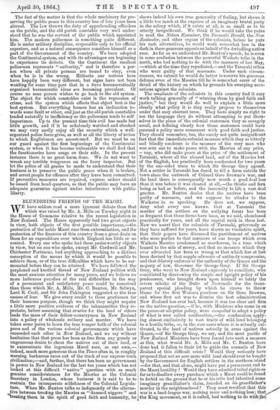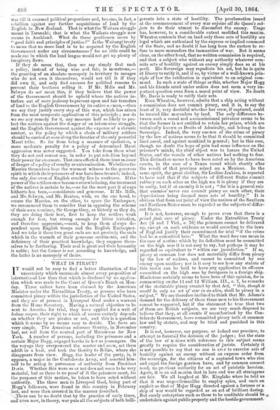BLUNDERING FRIENDS OF THE MAORI.
WE have seldom read a more ignorant debate than that which was raised by Mr. A. Mills on Tuesday night in the House of Commons relative to the recent legislation in New Zealand. The House apparently had two great objects in view, both objects of the first possible importance,---the protection of the noble Maori race from extermination, and the protection of the finances of this country from a great drain on them for an expenditure over which England has little or no control. Every one who spoke had these praiseworthy objects in view, but no one who spoke, except Mr. Cardwell and Mr. Chichester Fortescue, had anything approaching to a distinct conception of the means by which it would be possible to achieve them, or of the true difficulties which have to be sur- mounted before they can be attained. We have followed the perplexed and knotted thread of New Zealand politics with the most anxious attention for many years, and we believe no more ludicrous parodies of the real difficulties in the way of a permanent and satisfactory peace could be conceived than those which Mr. A. Mills, Mr. C. Buxton, Mr. Selwyn, Lord R. Cecil, and Sir John Pa.kington suggested as the true causes of fear. We give every credit to these gentlemen for their humane purpose, though we think they might require a little more positive evidence of the inhumanities they re- probate, before assuming that avarice for the land of others leads the mass of their fellow-countrymen in New Zealand into a policy of wholesale robbery and murder. We have taken some pains to learn the true temper both of the colonial press and of the various colonial governments which have succeeded each other in New Zealand, and we say without hesitation that that press has been as free from any greedy or ungenerous desire to cheat the natives out of their laud, or to exterminate the ingenious Maori race, as our o wn,— indeed, much more generous than the Times often is, in roughly warning barbarous races out of the track of our express. train civilization;—and, further, that there has been no government in power in New Zealand for the last ten years which has not looked at this difficult "native" question with as much genuine considerateness for the Maories as the Colonial Secretary in London, whose business it is said to be to restrain the intemperate selfishness of the Colonial Legisla- ture. When Mr. Buxton talks so indignantly of the alterna- tive between treating the Maories as "damned niggers" and 'atreating them in the spirit of good faith and humanity, he shows indeed his own true generosity of feeling, but shows it a little too much at the expense of an imaginary brutal party in the colony which, if it exists at all, is so small as to be utterly insignificant. We think if he would take the pains to read the Nelson Examiner, the Taranaki Herald, the New Zealander, and other organs of the colonists, before he puts his rash alternatives, he would work somewhat less in the dark in these generous appeals on behalf of the dwindling native race. As far as we understand Mr. Buxton's speech, he is even in some confusion between the powerful Waikato tribe in the north, who had nothing to do with the massacre of last May, —which at the time they repudiated,--and the Taranaki tribes who were guilty of that massacre. Under such circum- stances, we submit he would do better to reserve his generous defence even of the Maories till he is somewhat surer of the detail of the history on which he grounds his sweeping accu- sations against the colonists.
The assailants of the colonists in this country find it easy work talking generally of "winning them by good faith and justice," but they would do well to explain a little more clearly what policy it is they really propose to themselves under that easy abstract term. They have simply no right to use the language they do without attempting to put them- selves in the place of the colonial statesmen they so savagely assail, and defining clearly how those statesmen could have pursued a policy more consonant with good faith and justice. They should remember, too, the surely not quite insignificant fact that the immediate colonial measure which they so bitterly and blindly condemn is the measure of the very man who was sent out to make peace with the Maories at any price, — nay, who did make peace at the price of the settlement of Taranaki, where all the cleared land, not of the Maories but of the English, has practically been confiscated for two years by the one-sided truce to which Sir George Grey agreed. Not a settler in Taranaki has dared to till a farm outside the town since the outbreak of Colonel Gore Browne's war, and the land there is consequently now worth a good deal less than it was before it was cleared at all,—the thistle and fern being as bad as before, and the insecurity to life a vast deal greater. Mr. Buxton denies that the natives have been guilty of massacre, and we suppose he alludes to the Waikatos in so speaking. He does not, we suppose, deny what every one knows, that at Taranaki the murder of the settlers on the outlying farms has been so frequent that those farms have been, as we said, abandoned practically for years, and all the capital sunk in them lost. Now we assert that the colonists of Taranaki, grievously as they have suffered for years, have shown no vindictive spirit, that their papers have discussed the punishment of natives who were parties to that massacre of our troops which even Waikato Maories condemned as murderous, in a tone which leaned to the side of mercy, and that no measure which they ever advocated has been so strong as that which has at last been devised by that supple advocate of untimely compromise, and that dilatory enforcer of the authority of the Queen and the majesty of law, Governor Sir George Grey. If Sir George Grey, who went to New Zealand expressly to conciliate, who conciliated by disavowing the simple and upright policy of his predecessor, who brought down upon himself so lately the severe rebuke of the Duke of Newcastle for the trans- parent special pleading by which he strove to throw blame for the first Waitara purchase on Sir Gore Browne, and whose first act was to dismiss the best administration New Zealand has ever had, because it was too clear and firm on the native question,—if he, with Ministers who came in on the peace-at-all-price policy, were compelled to adopt a policy of what is now called confiscation,—the confiscation apply- ing almost exclusively to vast tracts of wild land belonging to a hostile tribe, or, in the rare cases where it is actually cul- tivated, to the land of natives actually in arms against the Queen,—if Sir George Grey, we say, and the most pacific of New Zealand Ministers have been forced into such a measure as this, what would Mr. A. Mills and Mr. C. Buxton have done had it fallen to their lot to guide the counsels of New Zealand at this difficult crisis ? Would they seriously have proposed that not an acre more wild land should ever be bought by the Government for English settlers in the northern island —for that, and that alone, might have put a permanent end to the Maori hostility ? Would they have admitted tribal rights so far as to disallow every purchase which a Maori could be found to forbid on the ground that he or his tribe had inherited some imaginary grandfather's claim, founded on his grandfather's murder in the neighbourhood ? They must recollect that this war is a land-league war, nothing more and nothing less; that -the King movement, as it is called, had nothing to do with war till it assumed political proportions and, became, in fact, a rebellion against any further acquisitions of land by the English in New Zealand. That is what the Waitara struggle meant in Taranaki; that is what the Waikato struggle now means in Auckland. What do these gentlemen mean by "good faith and principles of justice ?" Is the Waitangi treaty to mean that no more land is to be acquired by the English Government under any circumstances ? for DO title could be made out in which the land league would not get up plenty of imaginary flaws.
If they do mean that, then we say simply that such a policy, instead of being wise and fair, is monstrous,— the granting of an absolute monopoly in territory to savages who do not own it themselves, would not till it if they did own it, and only find excuses for political reasons to prevent their brethren selling it. If Mr. Mills and Mr. Selwyn do not mean this, if they believe that the power of the Government should be upheld where the natives in- terfere out of mere jealousy to prevent open and fair transfers of land to the English Government by its native o ners,--then we say they justify every step of this war, which has arisen from the most temperate application of this principle ; nor do we see any remedy for it, any measure half so likely to pro- tect the natives against the danger of an internecine struggle, and the English Government against the expense of a chronic contest, as the policy by which a chain of military settlers should be carried at once along the frontier of the only powerful Maori tribe. So far from being a measure of spoliation, a more moderate penalty for a policy of determined Maori aggression was never suggested. You take from them what they do not and cannot use, in order to put rebellion beyond their power for evermore. That once effected, there is no manner of danger of a policy of cruelty or extermination. Webelievethe Maories themselves bear the warmest witness to the generous spirit in which their prisoners of war have been treated; indeed, the only fear even of English cruelty lies in weakness. If the power of the settlers once becomes overwhelming, the treatment of the natives is certain to be,—as for the most part it always hitherto has been,—considerate and generous. If Mr. Mills, and Mr. Selwyn, and Mr. Buxton, wish, on the one hand, to secure the Maories, on the other, to spare the Exchequer, we recommend them to consider that in opposing the scheme of their own nominee, Sir George Grey, so bitterly as they do, they are doing their best, first to keep the settlers weak enough for fear, but strong enough for bitter irritation, and therefore aggression,—next, to keep them always de- pendent upon English troops and the English Exchequer. And we take it these two great ends are not precisely the ends which in the warmth of their generous sentiments, and the deficiency of their practical knowledge, they suppose them- selves to be furthering. Their zeal is great and their humanity is noble; but the former is not according to knowledge, and the latter is no monopoly of theirs.



































 Previous page
Previous page